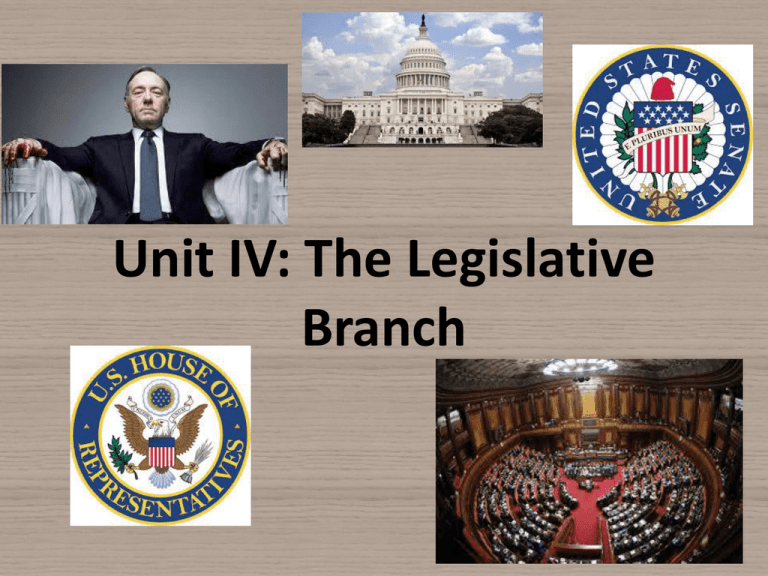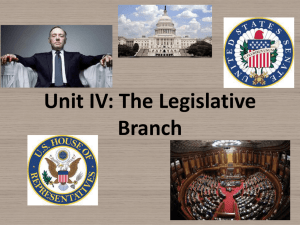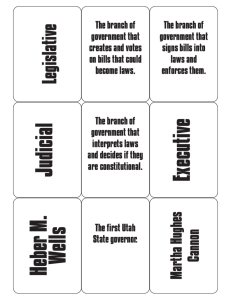Unit IV: The Legislative Branch
advertisement

Unit IV: The Legislative Branch Purpose of legislative branch: to write laws 2. All of the instructions for Congress (the legislative branch) can be found in Article 1 of the United States Constitution; it is the longest section of the Constitution. 1. SENATE HOUSE SIZE Two senators from each state = 100 total # from each state based on population = 435 WHO QUALIFIES? Must be at least 30, US citizen for 9 years, and live in state they represent At least 25, citizen for 7, live in state they represent THEY REPRESENT… Whole state Constituents from district SPECIAL DUTIES Approves presidential appointments (ambassadors, judges, and cabinet members); votes on impeachment All bills that deal with raising money (like taxes) must start in House; writes articles for impeachment CHECKS & BALANCES Congress can impeach the president, pass bills over veto with 2/3 vote, and create lower courts. President can veto bills & Supreme Court can strike down a law as unconstitutional ROLE IN LAWMAKING Bill can start in each chamber; APPROVED BY BOTH BEFORE GOES TO PRESIDENT 4. Most members serve on 5 committees 5. Incumbents (politicians in office) a. In the House, incumbents win re-election 90% of the time. b. In Senate, incumbents win 85% of the time 6. Advantages of being an incumbent A. Advertising = visibility = success and they get more money from individuals (2/3) and PACs (1/3) B. Credit claiming/blaming: using their congressional record to help define and enforce their public image Advantages of Incumbents B. Credit Claiming/Blaming 1. Pork barrel: spending on legislative for the state/district for certain needs and/or projects Pork Barrel and Examples-Fox News Clip 2. Casework: helping constituents as individuals 3. Riders: additions that are irrelevant to a bill, but the bill is too important to for anyone to object to the addition, so it passes Congress and is signed into law Riders in 2015 Spending Bill and More Policy Riders Examples C. Position taking: they have already defined their position on certain issues important to constituents 7. Roles of Congressmen (How do they vote?) A. Delegate: vote based on constituents opinion B. Trustee: vote based on personal opinion C. Partisan: voted based on party lines D. Politico: vote in a balanced fashion taking all things into account 8. States have two senators, regardless of population; however, in the House of Representatives, population determines representation. How do we determine this? – Every 10 year there is a census. This tells up the population of jurisdiction. – Reapportionment and redistricting can occur, which can give a state more (or less) representation. – New boundaries drawn must be drawn to comply with Supreme Court rulings and to make sure districts are fairly equal in size. • Gerrymandering: Majority party in state legislature redraws boundaries for districts to assure that the new district will re-elect the maximum numbers of representatives to that house Gerrymandering 9. Organization of Congress – House: Members often vote along party lines, power is usually hierarchal, they introduce revenue bills, issue articles of impeachment, rules committee determines which bill will be heard by full house after coming from committee – Senate: Members behave more independently of party, power is more evenly distributed, approve presidential nominations, ratify treaties and hold trials of impeachment, senator can filibuster (ultimate debate on a bill and have to vote cloture to stop) 9. Congressional Leadership – Speaker of the House (currently John Boehner, Republican): assigns representatives to committees; chosen by majority party, assigns bills to committees, recognizes speakers in debates, rule on the relevance of motion made during debates and presides over all joint sessions except electoral count – President of the Senate = Vice President (Joe Biden, Democrat) • But, President Pro Tempore is honorary substitute for Vice President and majority leader hold real power as the active leader. – Job of majority leader: schedules debates, legislative votes, and rallies party votes – Job of majority whip: acts as spokesperson for votes, tries to gather/whip votes on bills




